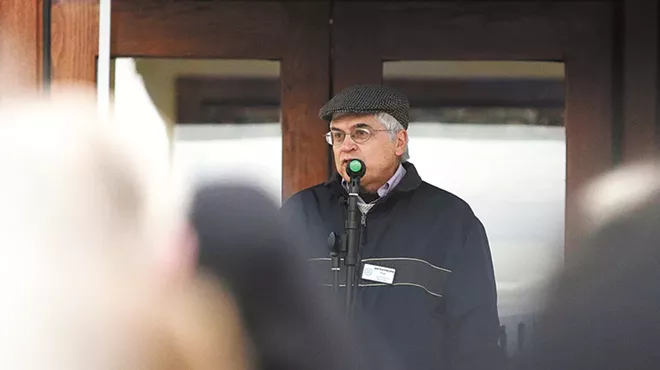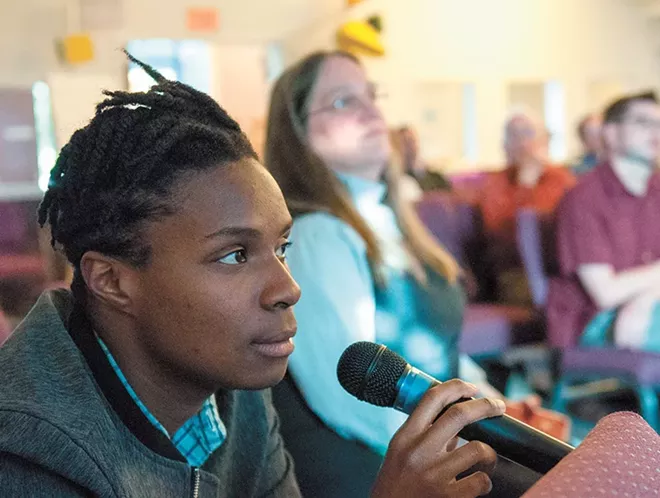
Initially, Wood responded with outright denial.
No, he repeatedly insisted, he was not aware of any recent strife or conflict within the party. No, he claimed, he wasn't aware of any grievance filed against him, and even if he was, he wouldn't be allowed to talk about it because of the party's rules.
That was on June 5. But a week later, Wood — and all the other executive officers on the board of the local Democratic Party — declared they were resigning.
To Wood, the mass resignation was entirely the fault of Tina Podlodowski, chair of the Washington State Democrats.
He continued, "This is not a way to run a party and I will no longer be a part of this."
Wood has a cadre of fervent supporters — they praise him for his ability to rapidly raise enough funds to pay for the $47,300 in campaign finance fines left as a consequence of previous leadership's mismanagement.
But the voices against Wood have been growing increasingly louder over the past two and a half years — and in the last six months they've become a fervent chorus.
"Once it became clear that the party is a toxic place for me, as a queer person, as a black person, as a young person, I realized I could not be a good soldier anymore," Archer tells the Inlander. "I couldn’t in good faith encourage people to get involved with the local Democratic Party anymore."
“Over the course of the last year, the leadership of the Spokane County Democrats have, on multiple occasions, belittled young people, engaged in bigotry, refused to use preferred pronouns, and exhibited racism towards our members,” the group wrote.
Wood dismissed the Young Democrats' allegations as essentially slanderous and the party didn't respond to it.
But Podlodowski says that it wasn't just one formal complaint against Wood — it was three. All of them, she says, were serious enough for the state party to recommend the local grievance committee take action. And when it seemed like the grievance committee was dragging their feet, she says the state party began to take matters into their own hands.
She casts Wood as a "fundamentally good man — an honest man — who is struggling with change" and who had repeatedly failed to adapt to Democratic values of inclusion and equity and listen to those who'd been demanding a voice.

To understand the divide, start with Jac Archer and Ed Duhaime.
Like Ed Wood, Ed Duhaime is a white-bearded white man. A 66-year-old Bernie Sanders supporter, Duhaime argues that Democrats spent too little time on labor issues and "ordinary working people" and too much time on things like "racism, feminism, gender issues, those kinds of things."
From 2016 to 2018, he was the local party's state committeeman. And until last year, he was the local group's unofficial volunteer coordinator: He'd greet people at the front desk, he'd do odd jobs around the office, he'd help manage volunteers for events.
But Jac Archer, who served as the local party's vice-chair, is a black trans activist passionate about precisely the sort of issues that Duhaime disparages as a distraction.
It's personal. Archer identifies as a "demi-guy" — a nonbinary person who leans toward the masculine gender identity — and prefers the gender-neutral pronoun “they.”
Duhaime refuses to extend that courtesy. He says it's a matter of principle, of linguistics. If he thinks a trans woman looks enough like a man, he'll call her a "he," he tells the Inlander. It's either "he" or "she," he believes, but never "they."
"For crying out loud, you are trying to attack me over 'they, them and their' and it's not even my culture and I'm doing the best I can to remember when I can to do that."
Duhaime says.
So in early 2018, shortly after Wood was elected chair, Duhaime made his opinions known to Archer. Duhaime went off on a 15-minute tirade about his pronoun policy, Archer says, denouncing activists for "bullying" changes into the language.
Archer remembers ducking around the corner after the meeting and bawling.
While Wood called Archer to apologize for Duhaime's behavior, Duhaime remained in his position as the local party's state committeeman. Wood casts Duhaime's refusal to use a person's preferred pronoun as merely an agree-to-disagree situation.
To Archer, Wood's failure to take action against Duhaime — in a year when a trans woman was running as the Democrat's Spokane County Commissioner candidate — was inexcusable.
"I don't know how to explain what it's like to have someone look you in the face and say, 'I do not care how my words make you feel,'" Archer says. "'I do not care how important this is to you. I am going to willfully intentionally disregard you, your identity and your feelings.'"
Calling a transgender person by the wrong pronoun is exactly the sort of behavior that leads to hostile work environment complaints, according to the Equal Employment Opportunity Commission.
Archer's complaint wasn't just about Duhaime. Archer and several other local Democrats interviewed complained that Wood would frequently refer to Archer as "she" or "her" when Archer was outside the room, despite being frequently corrected.
While nearly every person the Inlander interviewed for this story inadvertently used the wrong pronoun to refer to Archer at least once, several sources argued that the frequency of Wood's misgendering went beyond simple carelessness.
But Wood says he's genuinely trying, and you should cut him some slack.
"I'm 73 years old, OK!? 'They and them' is new to almost everybody in our age group,” Wood counters. "For crying out loud, you are trying to attack me over 'they, them and their' and it's not even my culture and I'm doing the best I can to remember when I can to do that. What more can society expect from me or anybody else in the Democratic Party?"
Another of Wood's supporters in the party hands the Inlander two 11-inch-by-17-inch color printouts of Facebook screenshots showing Archer praising Wood in 2018 for informing a bank teller about Archer's pronouns.
But the issue wasn't settled. While Duhaime didn't run again for state committeeman, he continued to serve as the front desk volunteer. And after a marathon Facebook argument last year with other local Democrats, where he decried preferred pronouns as "narcissism run amok," the calls for Duhuime's resignation got louder.
But when local Democratic precinct committee officer Rebekah Mason wanted the letter to be read aloud at one of the party's board meetings, Wood refused to allow it, claiming that would be against the party's rules.
"I was yelled at, told that I was out of order," Mason says.
To Wood and Winkes, Duhaime's resignation represented an irreplaceable loss of a tireless volunteer.
But Duhaime quitting didn't solve the concerns that LGBT members of the party had with the leadership. Archer sent a grievance over Wood's leadership to the state party in December.
And Mason, feeling her concerns had been met with "resistance, denial and gaslighting," filed a grievance with the state in February.
Ultimately, it's a central question for the Democratic Party: Can the Democrats' big tent include both Ed Duhaime and Jac Archer?
"A party where transphobia is acceptable," Archer says, "is not a party that I'm going to be a part of."
SAFETY ISSUES
By contrast, you'd think a resolution condemning white nationalism would be simple. Two years ago, the Spokane County Republican Party had made national news when their chair hosted a member of the white supremacist group Identify Evropa and claimed he'd been "label lynched."
But when the Spokane County Democrats set out to pass a resolution condemning hate groups in early 2019, it quickly devolved into infighting.
But Archer and others wanted to go further: Their proposed resolution dedicated Democrats to ask local leaders — including every candidate asking for the party's endorsement — to refuse to ever offer a platform to hate groups. It named organizations like Identity Evropa, Patriot Prayer and the Proud Boys as examples.
But Winkes and others worried that the resolution could put their lives in danger.
The party could lock the doors, Winkes says, but then an attacker could shoot through the glass.
And Wood was outraged that their proposal hadn't gone through the resolutions committee first. Precinct committee officer Erin Ormsby recalls Wood declaring he'd been "stabbed in the back" by Archer at a February 2019 resolutions meeting.
According to witnesses, Wood stormed out after getting into a yelling match with Jeff Beaulac, a state committee member who had a reputation for aggressive verbal exchanges.
By the time the two anti-white nationalist resolutions came up for a vote at the Spokane County Democrat's quarterly central committee meeting in March of 2019, Wood officially endorsed both resolutions.
But that doesn't mean the meeting went smoothly.
At first, Wood refused to allow Archer to speak about the proposed resolution, claiming that Archer hadn't signed in.
"We have rules, I hate to tell you," Wood tells the Inlander.
But Wood had interpreted the rules wrong. A ruling from the party's parliamentarian concluded that Archer was allowed to speak.
Wood scoffs at the notion that anyone could object to how things went down.
He points out that both resolutions ultimately passed. But Archer felt that Wood had attempted to take away their voice.
“I can't tell any of my black friends that they should join the Democrats, because I haven't seen any evidence that they'll be treated well,” Biviano says. "I had hard evidence that they weren't going to feel accepted or feel safe. I didn't want to be a part of a place that wasn't welcoming other people."
"And now I know why," Biviano says.
When the Inlander shared Biviano's concerns with Wood, Wood blamed Biviano for not telling him how he felt.
"Andrew has never brought one concern to me!" he says. "I would have listened to what Andrew had to say! And I would have addressed it! This is what's driving me nuts. You're getting more information from these people than I've got. I don't have any."
Still, local NAACP President Kurtis Robinson says, he'd expressed his own concerns to Wood last year and offered to help address some of the issues.
"We offered a race and equity statement," Robinson says. "We had offered to do race and equity training — we never heard anything."
While Wood and Robinson recently spoke in a video chat about the party, Robinson says there's a lot more to be done.
THE EXODUS
Other controversies have abounded. In Archer's grievance, Archer provided the state party with evidence suggesting Archer's email account was being accessed by other members of the party without Archer's knowledge. In November, Young Democrats Chair Nick Castrolong emailed Podlodowski with complaints about everything from transphobia to the lack of childcare during the quarterly meetings.
In April, another precinct committee officer, Angie Beem, filed a grievance with the Washington State Democrats that recounted angry outbursts from Wood and described the Spokane County Democrats as being controlled by "a small group of people manipulating and playing games to fulfill their personal agendas."
But Stuckart, the former City Council president, continued to defend Wood. If it weren't for Wood, Stuckart says, there wouldn't be a local Democratic Party organization today. Wood put in the time and put in the work — while his critics didn't.
Still, there's a stark difference between the way the two sides of the party understand the issues confronting it. Wood's complaints are all about rules, about processes being followed and hierarchies being honored. Archer was out of line for talking too publicly to the press about the various complaints, he claims, and Podlodowski was out of line for exceeding the state party's authority.
But to Archer and others, it's about an unwillingness to address the party's deeper issues including transphobia, racism and representation. Wood was part of the problem, Archer says, but only the symptom of a larger issue.
"I don't want to make it sound like he was a big bad wolf, because there are no big bad wolves," Archer says. "There are just bullies and the people who empower them."
But today, he's no longer part of the local party's leadership either. Neither is Wissink.
Wood says the party has 30 days to hold a special election to choose new leadership.
Archer was "honestly completely shocked" by the resignation and says, "I am hopeful that this could mean a fresh start for the party."
This, after all, is the moment of a dramatic societal shift, Podlodowski says, and while that can be tough for some, it's the job of the Democratic Party to embrace it.
"The thing that, in the end, makes us Democrats is that we move forward with that kind of progressive change," she says. "Just saying 'All we do is elect Democrats' is not good enough."




























